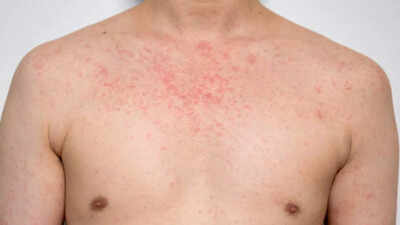ARTICLE AD BOX

A fully vaccinated woman in her mid-20s has tested positive for measles in Dallas County, Texas. This triggered a red alert across one of America’s most populous regions. Though vaccinated, she was contagious for over a week, from May 30 to June 7, potentially exposing thousands at locations in Dallas and nearby Plano, according to a report of Daily Mail.
This is the first reported case in Dallas amid a larger outbreak that has already infected nearly 800 people statewide and claimed the lives of two children. The case has raised alarm bells as health officials race to contain what’s been dubbed the world’s most contagious disease.
First case of measles sparks alarm amid ongoing Texas outbreak
The infected woman visited Lemma Coffee in downtown Plano on May 31 and the First Baptist Church on June 1. Authorities are now tracking her movements and notifying potentially exposed individuals.
Although this is currently classified as an isolated incident, it coincides with a growing outbreak across Texas — with 744 confirmed cases and 96 hospitalizations since January. Two deaths have been reported in unvaccinated school-aged children, intensifying the public health response.
Why measles is one of the most dangerous and contagious viruses in the world
Measles is far from a harmless childhood illness. It spreads through the air and remains active on surfaces for up to two hours, infecting 90% of unvaccinated people exposed to it.
Symptoms begin with a fever, cough, and runny nose, but rapidly develop into tell-tale red rashes and small white spots inside the mouth. If untreated or contracted by vulnerable individuals, it can lead to severe complications such as pneumonia, brain swelling, and even death.
Vaccinated but still infected: Understanding breakthrough measles cases
Although the woman in Dallas was fully vaccinated, rare "breakthrough" infections can occur. The measles, mumps, and rubella (MMR) vaccine is 97% effective after two doses, but no vaccine offers absolute protection.
Still, vaccinated individuals typically experience milder symptoms and are less likely to transmit the disease. The greatest concern lies with the unvaccinated population, especially children under 5 and individuals with weakened immune systems.
CDC issues travel advisory: Airports and crowded spaces can be hotspots
The CDC warns that travelers are at heightened risk, especially in crowded places like airports, train stations, and large events. Infected travelers can unknowingly carry the virus across state and national borders, spreading it to communities with lower vaccination coverage.
The advisory urges travelers to verify their immunity and ensure they’re up to date on MMR vaccinations before flying, particularly to or from international destinations.
Falling vaccination rates are fueling measles’ dangerous comeback
A troubling national trend is worsening the outbreak: childhood MMR vaccination rates are slipping. A Johns Hopkins University study found that 78% of US. counties saw declines in MMR coverage in 2024. The national average now stands at 91% — well below the 95% threshold needed to maintain herd immunity.
If this continues, measles could shift from an occasional threat to a recurring public health crisis, reversing the US.
's 2000 declaration that the virus had been eliminated.
Preventive measures for measles
- Get vaccinated: Ensure that all children receive two doses of the MMR (measles, mumps, rubella) vaccine — first between 12–15 months and the second between 4–6 years of age.
- Early dose for infants before travel: Babies aged 6–11 months should receive an early dose of the MMR vaccine if traveling internationally or to outbreak-prone areas.
- Check adult immunity: Adults born after 1957 should confirm their vaccination records or get a blood test to check for measles immunity.
- Avoid exposure during outbreaks: Limit visits to crowded places like airports, public transportation, and large gatherings if there’s a known outbreak in your area.
- Practice good hygiene: Regular handwashing, avoiding touching your face, and disinfecting frequently-touched surfaces can reduce the risk of viral transmission.
- Isolate if infected: Anyone diagnosed with measles should stay isolated for at least four days after the rash appears to avoid infecting others.
- Stay informed: Monitor local health alerts and follow public health guidelines during measles outbreaks, especially when traveling
What to do if you think you've been exposed to measles
According to Daily Mail, Dallas County health officials urge anyone who visited Lemma Coffee on May 31 between 9 a.m. and noon or First Baptist Church on June 1 between 1 p.m. and 5:30 p.m. to contact their healthcare provider immediately. Watch for symptoms like fever, coughing, and rash for up to 21 days after possible exposure. Adults unsure of their immunity should consult a doctor, and parents are urged to ensure their children are fully vaccinated.



.png)
.png)
.png)
















 4 hours ago
3
4 hours ago
3









 English (US) ·
English (US) ·